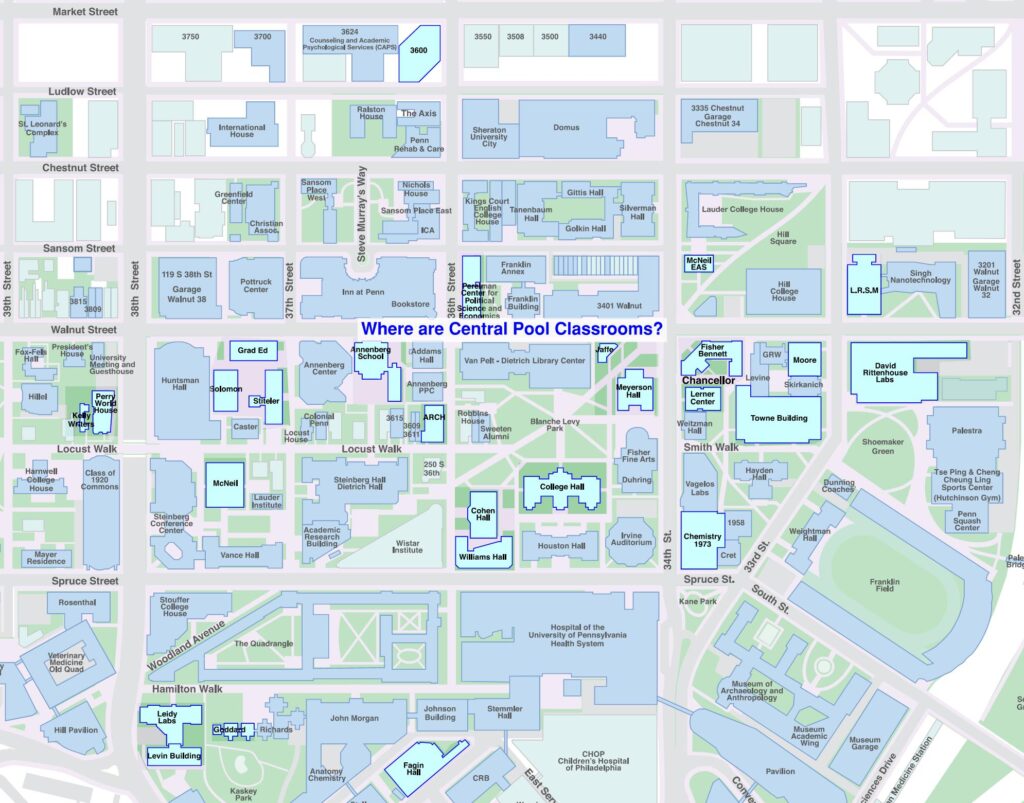
A Central Pool Classroom is a classroom managed by the Provost Office in partnership with the Office of the University Registrar and Classroom Technology Services. The Central Pool Classroom system comprises approximately 200 classrooms in 29 buildings throughout Penn’s campus. Pool Classrooms are prioritized to support Undergraduate and Graduate Courses regardless of the School by which it’s offered. When not in use for scheduled classes, Central Pool classrooms and auditoriums can be requested for academic-related events by faculty and staff through the Scheduling Portal, managed by the Office of the University Registrar.
For more information about each building, please click here. For general information about the Central Pool Classroom space types, see below. For our most recent strategic projects and design initiatives, please see Strategic Renovation Projects.
About Central Pool Classrooms:
Central Pool Classrooms serve as a vital resource for the entire University community by providing shared spaces that are efficiently managed and maintained. Oversight of these rooms ensures their physical upkeep, while audio-visual systems are upgraded every six years to maintain a consistent and modern user experience. Financial responsibilities for allocated space charges, as well as the costs and objectives of capital renovation projects, are handled by the Provost’s Office. Additionally, centralized scheduling across all pool rooms promotes efficiency and accessibility for users
For inquiries about including or excluding a room in the Central Pool, please contact Gary Purpura (gpurpura@upenn.edu)
A glimpse at the Central Pool Inventory and Space Types:
General Classrooms:
- There is a wide range of general classrooms to support various course sizes. These classrooms are often forward facing but are flexible to support different methods of teaching.
Seminar Rooms:
- Often include a conference-style table where all students and instructors gather around
Auditoriums:
- There are currently 19 auditorium spaces in the Central Pool, ranging from 67 seats to 406 seats and several sizes in between.
- Auditorium spaces in the Central Pool currently include fixed tablet arm student seating
SAIL Classrooms:
- SAIL (Structured, Active, In-Class Learning) classrooms are designed to support structured, in-class activities in which students work to solve problems, interpret data or evidence, or otherwise engage in real practices in the discipline. SAIL classrooms typically have students seated at tables, working in groups, with instructors circulating and guiding the process.
- There are currently 3 SAIL Classrooms in the Central Pool: David Rittenhouse Laboratory A5 & 3N1H, and Fagin 214.
- SAIL Classrooms Provided by the Schools and Centers include Levin Building 111 (School of Arts and Sciences), Vagelos Laboratories 2000 (School of Arts and Sciences), and Van Pelt-Dietrich Library Center Collaborative Classroom (Penn Libraries)
- For more information about the SAIL initiative and how you can integrate active learning strategies into your course, see the information provided by Penn’s Center for Excellence in Teaching, Learning, and Innovation.
Central Pool Classroom Collaborators
| Office of the Provost | provides funding |
| Central Pool Classroom Committee | provides recommendations and helps to align priorities with the overall goals of the Pool |
| Provost Administrative Affairs | oversees renovation efforts and manages day-to-day maintenance |
| Facilities and Real Estate Services | provides project management services for renovation efforts |
| Office of the University Registrar | manages the scheduling of courses |
| University Life Space and Events | manages scheduling of events |
| Classroom Technology Services | oversees the installation and maintenance of technology and provides second-tier technology support |
| Local Support Providers in the Schools | provide front-line technology and operations assistance |
Classrooms for courses, final exams, and academic events are scheduled through the University Registrar’s office. Scheduling for courses is based on the meeting block schedule with courses conforming to the block given priority.
University Life Space and Events schedules all student activities, events sponsored by Conference Services, and events for non-Penn groups.
Central Pool Classroom Faculty Committee
The Central Pool Classroom Committee is charged with recommending an annual budget for the central pool and developing guiding principles for Central Pool (CP) classroom design, technology, utilization, scheduling, and renovation to support the range of pedagogical approaches and projected academic program growth within the schools that use the pool. This committee has broad representation from across the Schools.